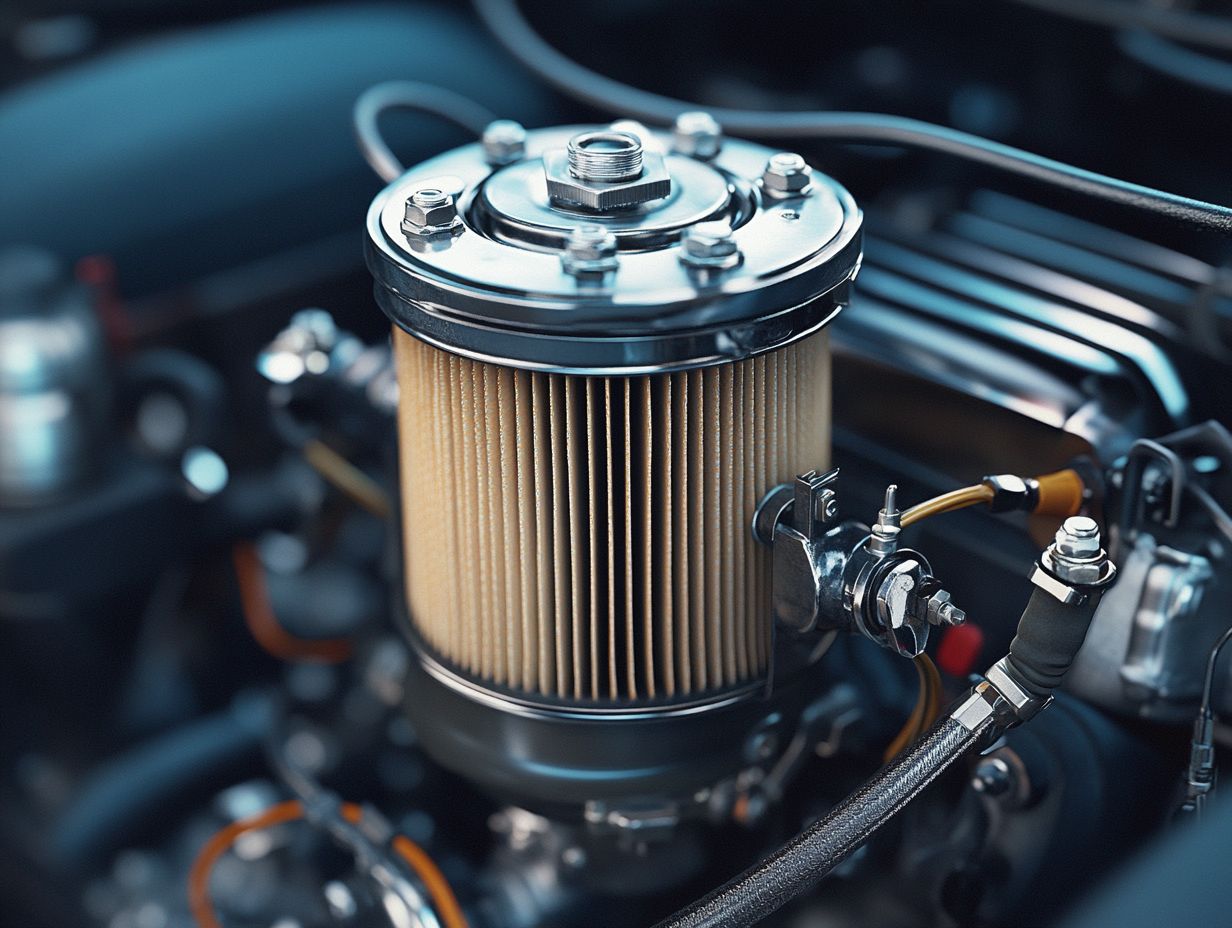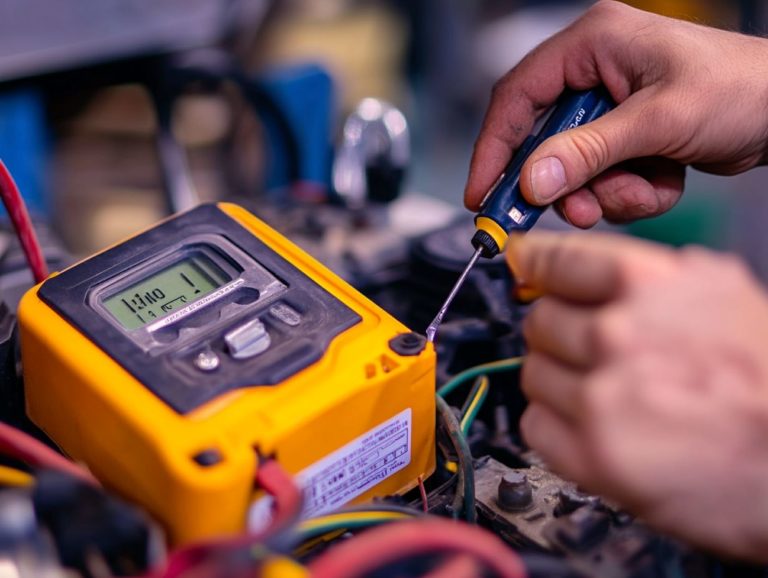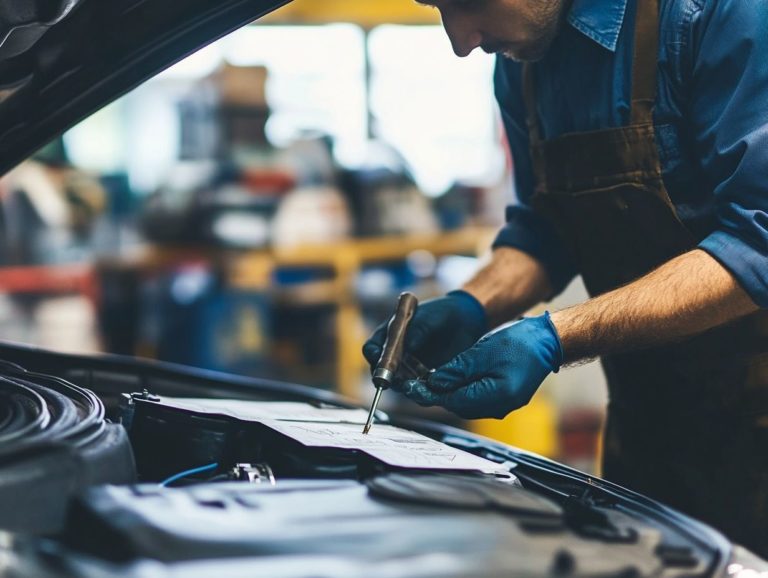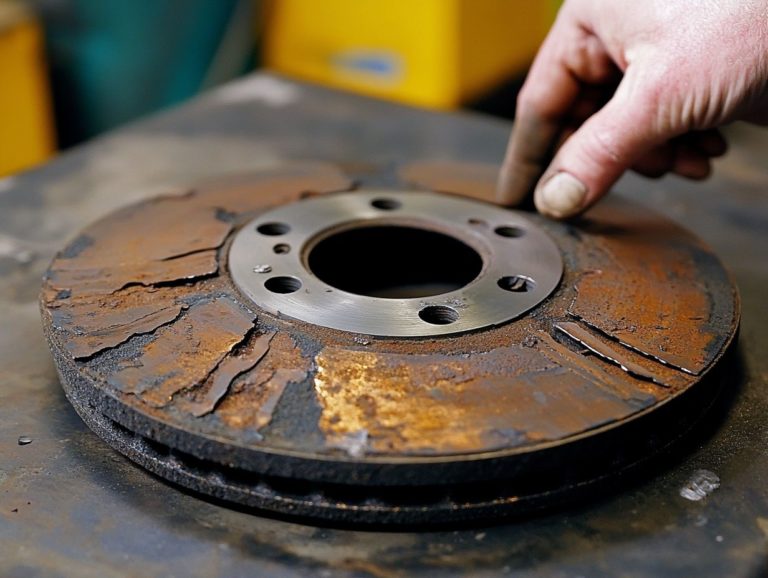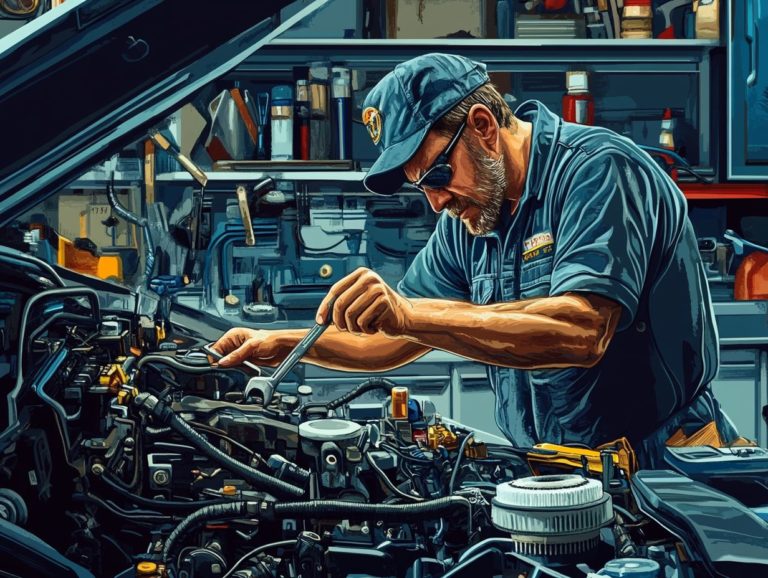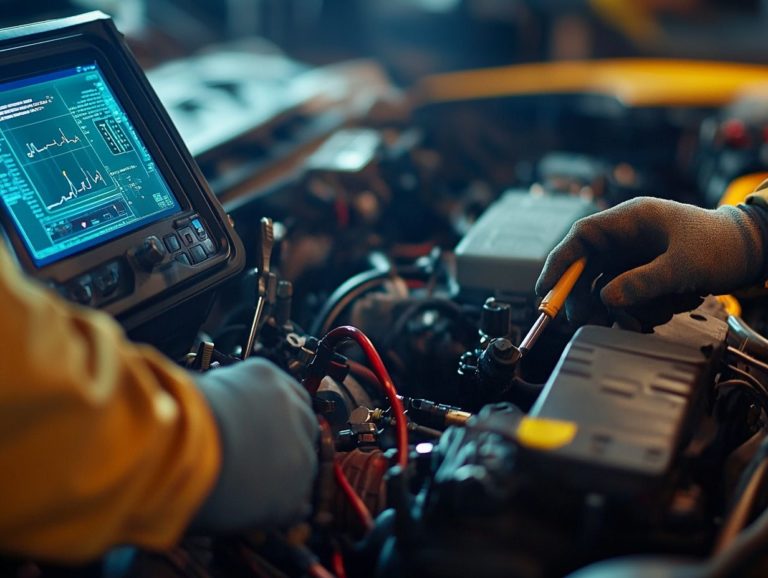Understanding the Role of Fuel Filters
Fuel filters play a crucial role in your vehicle’s fuel system, ensuring that impurities don t disrupt engine performance. This article delves into what fuel filters are, explores the different types available, and helps you identify the signs of a clogged filter. It emphasizes the importance of regular replacement to keep your vehicle running efficiently and provides a step-by-step guide on how to change a fuel filter.
Get ready to discover valuable tips for choosing the perfect filter! Whether you’re a seasoned mechanic or a DIY enthusiast, this guide equips you with essential knowledge for optimal vehicle care.
Contents
Key Takeaways:
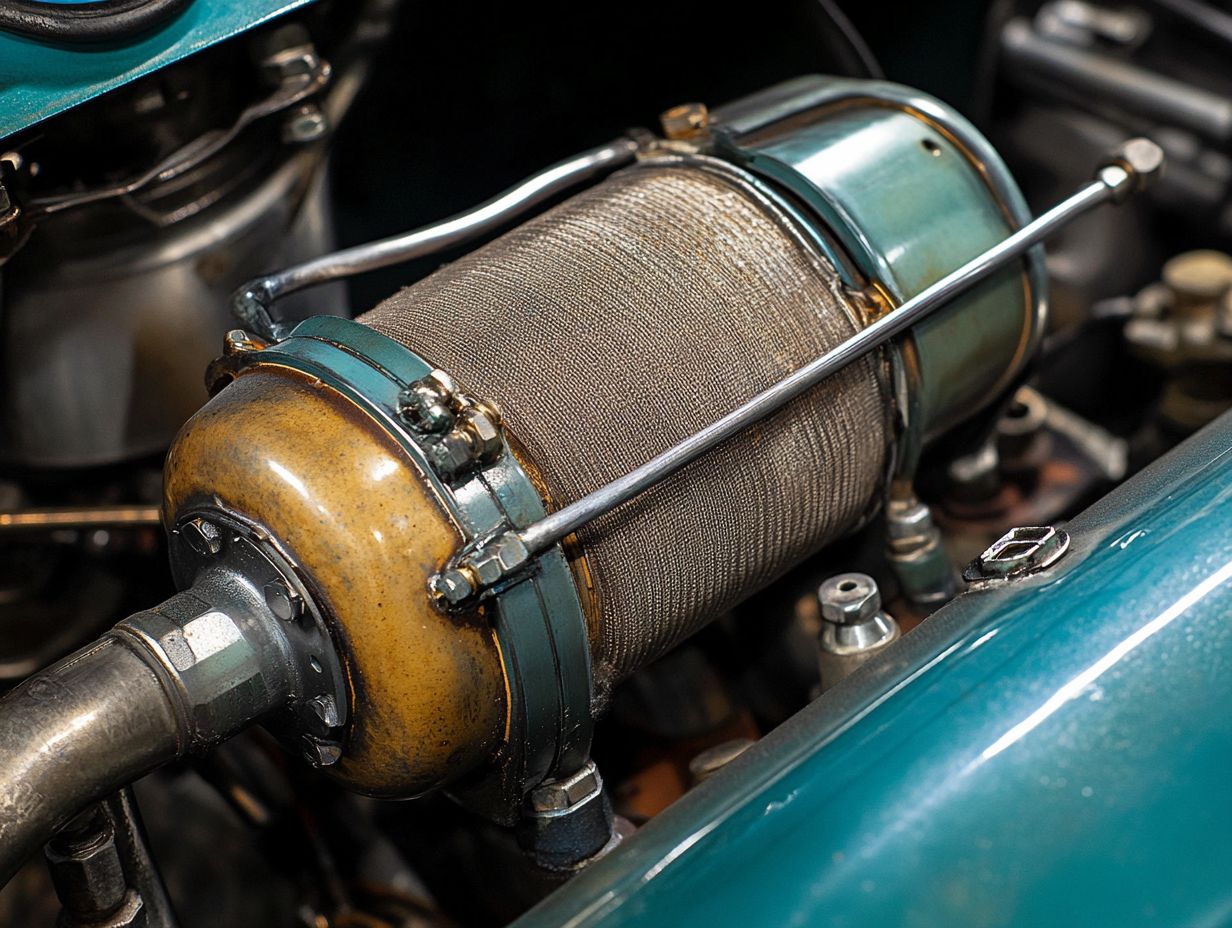
- Fuel filters are your engine’s first line of defense against contaminants!
- Various types of fuel filters include inline, cartridge, and spin-on filters, each with unique advantages.
- Regular maintenance and timely replacement of fuel filters help maintain optimal engine performance.
Why Fuel Filters Matter!
Fuel filters are critical components in the fuel system of diesel engines, carefully made to eliminate contaminants like dirt, rust, and water. This ensures your engine operates at its best.
These filters maintain fuel quality, directly impacting both the reliability and efficiency of your engine. They safeguard it from potential damage caused by impurities in the fuel.
For heavy-duty trucks and other diesel-powered vehicles, understanding the intricacies of fuel filtration is essential for achieving durability and peak performance.
Definition and Function
The primary function of fuel filters is to keep your fuel system pristine by filtering out contaminants that could negatively impact your engine s performance. These vital components trap dirt, rust, and debris that accumulate in fuel tanks and lines over time.
By preserving the purity of the fuel, they ensure efficient combustion within the engine, ultimately boosting its longevity and reliability. The fuel filter also acts as a protective barrier against issues like poor fuel atomization and reduced power output, which can arise from clogged or compromised filters.
You must regularly maintain and replace these filters for best results. This guarantees optimal fuel delivery and mitigates the risk of expensive repairs due to engine damage caused by unwanted particles.
Types of Fuel Filters
Fuel filters are available in various types, each designed for specific applications within diesel engines. You’ll find inline filters, cartridge-type filters, and fuel water separator filters, with each one playing a distinct role in preserving fuel quality.
Overview of Different Types
Inline filters are designed for seamless installation directly in the fuel line. Cartridge-type filters offer the convenience of independent replacement. Fuel water separator filters are vital for removing water from diesel fuel, safeguarding your engine’s integrity.
Each filter type presents distinct advantages tailored to meet specific diesel engine performance needs. If you prefer a streamlined system without unnecessary bulk, inline filters are particularly efficient. Cartridge-type filters are ideal for maintenance-heavy environments, offering effortless replacement options.
Fuel water separator filters protect your engine from water contamination, which can lead to significant issues if left unaddressed. Understanding the nuances of installation and upkeep is essential for anyone looking to optimize fuel filtration and enhance overall engine reliability.
Choosing the right filter hinges on factors like engine type, application, and environmental conditions. This ensures that your performance remains at its peak. Ensure your engine stays at peak performance check your fuel filter today!
Signs of a Clogged Fuel Filter
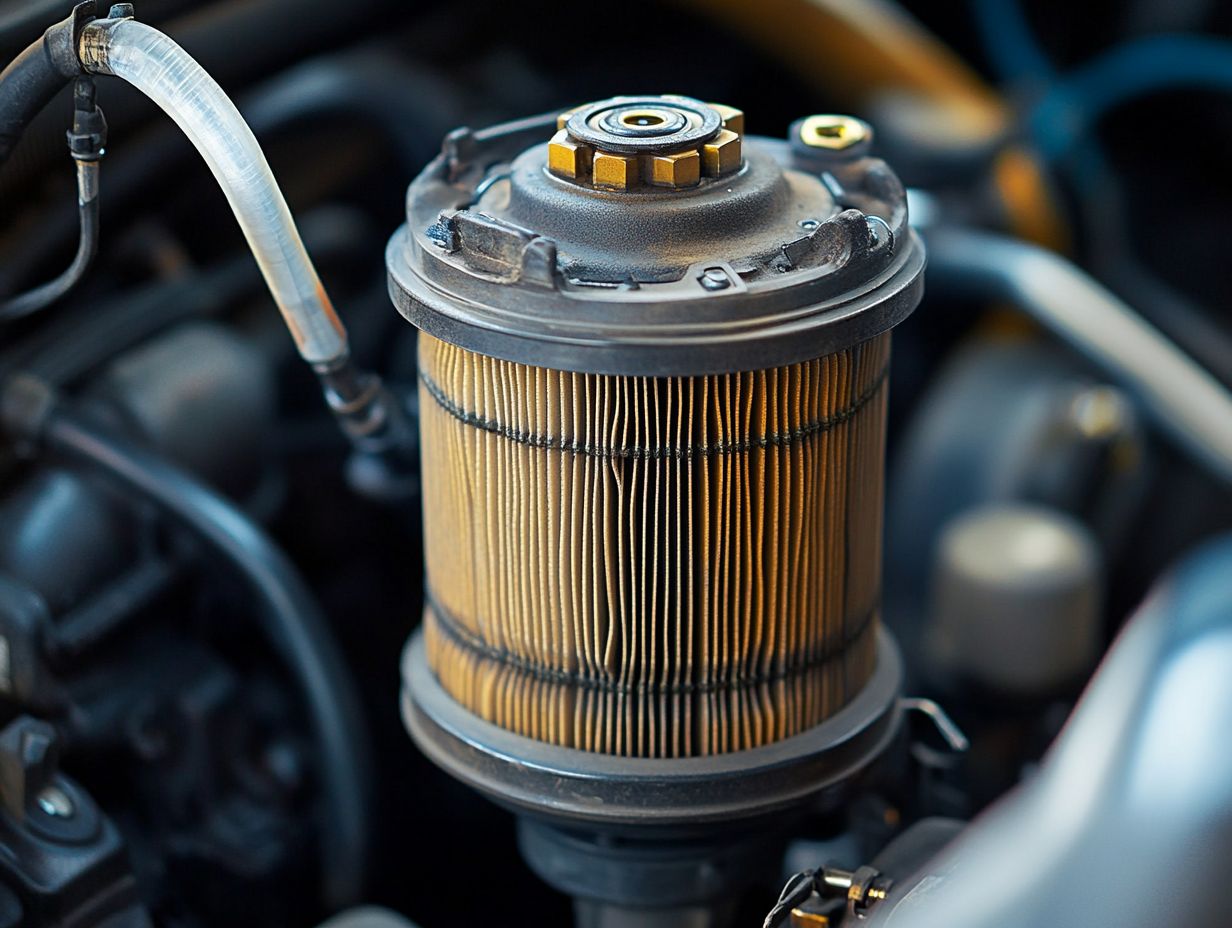
Identifying a clogged fuel filter is essential for maintaining optimal engine performance. A blocked filter can significantly reduce fuel flow and engine power, presenting noticeable symptoms that warrant your immediate attention.
Addressing this issue promptly ensures your engine operates at its best, keeping your vehicle running smoothly.
Identifying Common Symptoms
Common symptoms of a clogged fuel filter include engine misfires, reduced acceleration, and difficulty starting your vehicle. These issues can significantly affect the performance of diesel engines.
When the fuel filter becomes obstructed, it restricts the fuel flow, leading to an insufficient supply to the engine. You may experience stalling or hesitation during acceleration.
This can result in a frustrating and potentially unsafe driving situation.
A clogged filter can also produce unusual sounds from the engine, signaling increased strain due to poor fuel delivery. The overall reliability of your vehicle diminishes as engine performance becomes erratic and unpredictable. This ultimately heightens the risk of more severe engine issues if left unaddressed.
Therefore, timely maintenance is crucial to ensure that your vehicle functions at its best.
Why You Must Replace Your Fuel Filter Regularly!
Regularly replacing the fuel filter is essential for maintaining optimal fuel efficiency and safeguarding your engine. Neglecting this maintenance can cause diminished performance and potentially expensive repairs down the line.
Prioritizing filter upkeep not only enhances your vehicle’s efficiency but also protects your investment in the long run.
Benefits and Consequences of Neglecting Maintenance
The advantages of replacing a fuel filter are undeniable, offering improved fuel efficiency and minimizing costs associated with long-term engine damage. Neglecting this essential maintenance can lead to significant repair expenses down the line.
When you regularly replace your fuel filter, you ll likely experience smoother engine performance and better acceleration, enhancing your overall driving experience.
Ignoring this small yet crucial component can result in clogs that hamper engine performance and increase fuel consumption, making each journey more expensive.
The risk of contaminants entering the fuel system can escalate into serious issues, potentially damaging the fuel pump or injectors. The repair bills for such problems can easily run into the hundreds or even thousands of dollars.
By prioritizing timely fuel filter replacements, you can protect your investment and enjoy a more reliable driving experience.
How to Replace a Fuel Filter
Replacing a fuel filter is simple but requires careful attention. Disconnecting the fuel line, removing the old filter, and installing a new one all involve detailed steps for best performance.
It’s crucial to follow precise maintenance steps to ensure your vehicle receives meticulous care.
Step-by-Step Guide
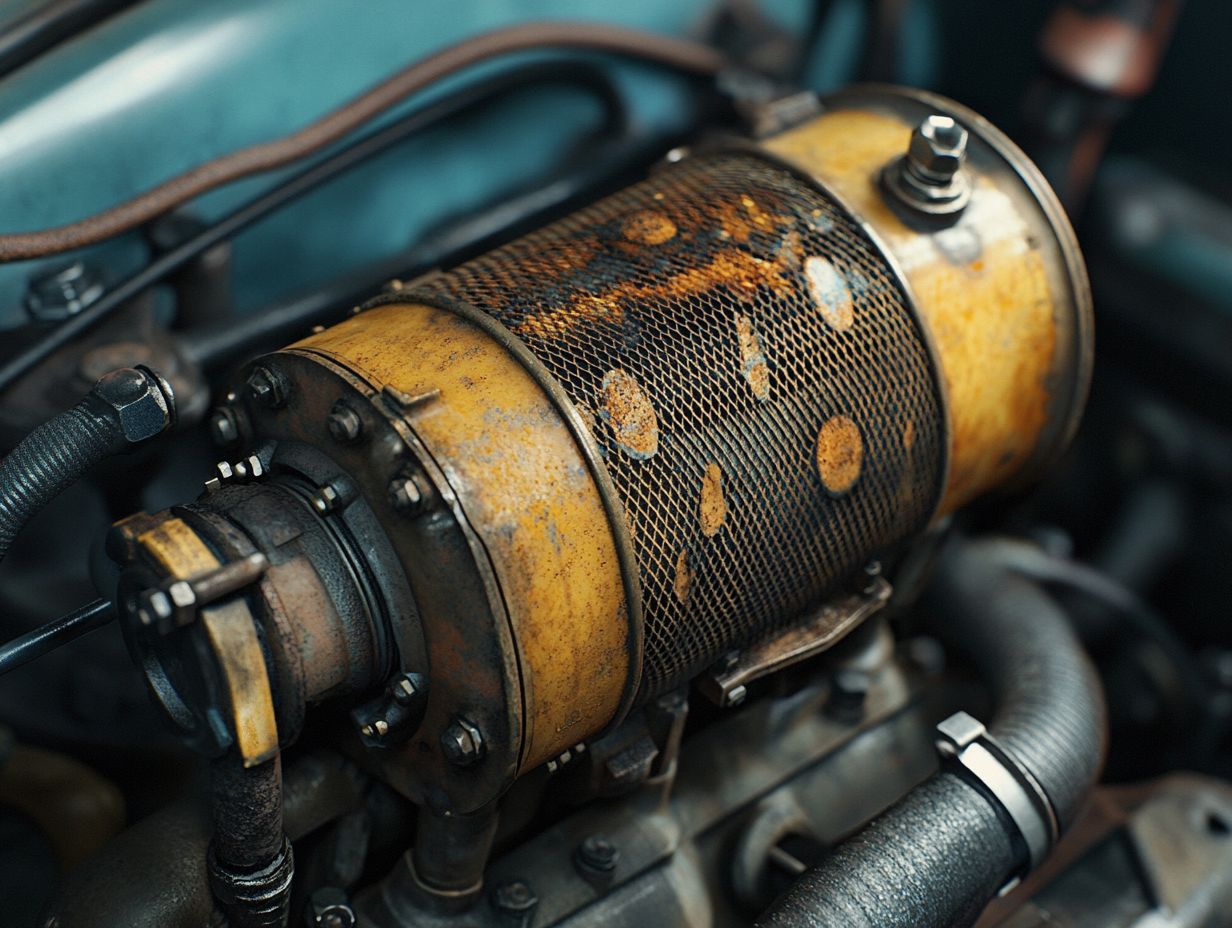
To replace a fuel filter, start by reducing the pressure in the fuel line. After that, disconnect the old filter and install the new one, making sure that all connections are secure.
Reducing the pressure is a critical first step; it prevents fuel from spraying out and creating potential hazards. Keep a rag handy to absorb any residual fuel.
Once the pressure is alleviated, proceed with caution as you locate and disconnect the fittings on the existing filter. Wearing safety glasses is a smart move to protect your eyes from any unexpected fuel splashes.
When you install the new filter, ensure it’s oriented correctly since some filters have a specific direction for fuel flow. After everything is connected, turn the ignition on briefly to check for leaks at the connections. This step reinforces the importance of proper maintenance for optimal engine performance.
Tips for Choosing the Right Fuel Filter
Choosing the right fuel filter is essential for getting the best performance from your diesel engine. You ll want to consider various factors, including the quality of the fuel, compatibility with your fuel system, and the specific types of contaminants, like dirt or water, that may be present in the fuel.
Choosing wisely boosts your engine’s efficiency and lifespan.
Factors to Consider
When selecting a fuel filter, several important factors are key. Look at the type of contaminants in the fuel, the specific requirements of diesel engines, and the recommended maintenance schedule.
These elements are crucial for how effectively your chosen fuel filter will perform in various conditions, impacting your vehicle’s performance and longevity. Understanding the specific contaminants in your fuel supply ensures optimal filtration to protect your engine components from wear and potential damage.
Diesel engines have unique fuel requirements. They need filters capable of handling higher pressures, meaning the filter must withstand strong fuel flow, and larger particle sizes. Sticking to a well-defined maintenance schedule is essential; skipping timely filter changes can lead to decreased fuel efficiency and increased emissions. These considerations enhance your engine’s reliability and efficiency.
Frequently Asked Questions
What is the role of a fuel filter?
A fuel filter is a vital component in your vehicle’s fuel system. It removes dirt and debris from the fuel before it reaches the engine, ensuring only clean fuel flows through, which prevents potential damage and maintains performance.
How does a fuel filter work?
A fuel filter traps debris and other contaminants before they enter the engine. It typically consists of a filter element made of porous material, like paper, allowing fuel to flow while trapping impurities. Clean fuel then flows through the filter and into the engine.
When should a fuel filter be replaced?
Replace your fuel filter every 20,000 to 40,000 miles, depending on your vehicle’s make and model. Always follow the manufacturer’s recommended maintenance schedule for optimal performance and to prevent engine damage.
What are the signs of a clogged fuel filter?
Common signs of a clogged fuel filter include engine stalling or hesitation, decreased fuel efficiency, difficulty starting the engine, and a rough engine idle. If you notice any of these symptoms, it s likely time to replace your fuel filter.
Can I replace a fuel filter myself?
While you can replace a fuel filter yourself, it s better to have a professional mechanic do it. This ensures the filter is installed correctly and that the fuel system is purged of any air pockets, which can cause engine issues.
What happens if a fuel filter is not replaced?
If a fuel filter isn t replaced when needed, it can lead to reduced performance, decreased fuel efficiency, difficulty starting, and potential damage from contaminants. Regularly replacing the fuel filter maintains a healthy fuel system and prolongs your engine’s life.

